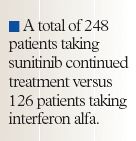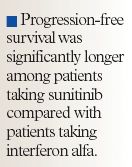- Safety & Recalls
- Regulatory Updates
- Drug Coverage
- COPD
- Cardiovascular
- Obstetrics-Gynecology & Women's Health
- Ophthalmology
- Clinical Pharmacology
- Pediatrics
- Urology
- Pharmacy
- Idiopathic Pulmonary Fibrosis
- Diabetes and Endocrinology
- Allergy, Immunology, and ENT
- Musculoskeletal/Rheumatology
- Respiratory
- Psychiatry and Behavioral Health
- Dermatology
- Oncology
Sunitinib demonstrates superior survival, quality-of-life benefits compared with interferon alfa
In patients with metastatic renal cell carcinoma, treatment with sunitinib yields longer progression-free survival rates and a better health-related quality of life than does the standard treatment, interferon alfa therapy, according to the results of a phase 3 trial published in the New England Journal of Medicine (NEJM). A total of 750 patients aged ≥18 years participated in this international, multicenter, randomized trial.

Key Points
In patients with metastatic renal cell carcinoma, treatment with sunitinib yields longer progression-free survival rates and a better health-related quality of life than does the standard treatment, interferon alfa therapy, according to the results of a phase 3 trial published in the New England Journal of Medicine (NEJM).

Participants were divided into 2 groups of 375 and were assigned to either repeated 6-week rounds of sunitinib 50 mg once daily for 4 weeks followed by 2 weeks without treatment, or subcutaneous interferon alfa 9 MU 3 times weekly. Treatment continued until the development of disease progression, unallowable adverse events, or consent withdrawal. Median treatment duration was 6 months (range, 1–15 months) in the sunitinib group and 4 months (range, 1–13 months) in the interferon alfa group. A total of 248 patients taking sunitinib continued treatment versus 126 patients taking interferon alfa. Factors leading to termination of treatment included progressive disease (25% of patients taking sunitinib vs 45% of patients taking interferon alfa; P<.001), adverse events (8% and 13%, respectively; P=.05), withdrawal of consent (1% and 8%, respectively; P<.001), and protocol violation (<1% in each group).

The authors stated that, based on trials to date, use of antiangiogenic therapy may be a realistic strategy for treating clear cell renal cell cancer. They suggested that more studies be conducted to further assess the efficacy of sunitinib in treating the disease.
SOURCE Motzer RJ, Hutson TE, Tomczak P, et al. Sunitinib versus interferon alfa in metastatic renal-cell carcinoma. N Engl J Med. 2007;356:115–124.
Coalition promotes important acetaminophen dosing reminders
November 18th 2014It may come as a surprise that each year Americans catch approximately 1 billion colds, and the Centers for Disease Control and Prevention estimates that as many as 20% get the flu. This cold and flu season, 7 in 10 patients will reach for an over-the-counter (OTC) medicine to treat their coughs, stuffy noses, and sniffles. It’s an important time of the year to remind patients to double check their medicine labels so they don’t double up on medicines containing acetaminophen.
Support consumer access to specialty medications through value-based insurance design
June 30th 2014The driving force behind consumer cost-sharing provisions for specialty medications is the acquisition cost and not clinical value. This appears to be true for almost all public and private health plans, says a new report from researchers at the University of Michigan Center for Value-Based Insurance Design (V-BID Center) and the National Pharmaceutical Council (NPC).
Management of antipsychotic medication polypharmacy
June 13th 2013Within our healthcare-driven society, the increase in the identification and diagnosis of mental illnesses has led to a proportional increase in the prescribing of psychotropic medications. The prevalence of mental illnesses and subsequent treatment approaches may employ monotherapy as first-line treatment, but in many cases the use of combination of therapy can occur, leading to polypharmacy.1 Polypharmacy can be defined in several ways but it generally recognized as the use of multiple medications by one patient and the most common definition is the concurrent use of five more medications. The presence of polyharmacy has the potential to contribute to non-compliance, drug-drug interactions, medication errors, adverse events, or poor quality of life.
Medical innovation improves outcomes
June 12th 2013I have been diagnosed with stage 4 cancer of the pancreas, a disease that’s long been considered not just incurable, but almost impossible to treat-a recalcitrant disease that some practitioners feel has given oncology a bad name. I was told my life would be measured in weeks.
